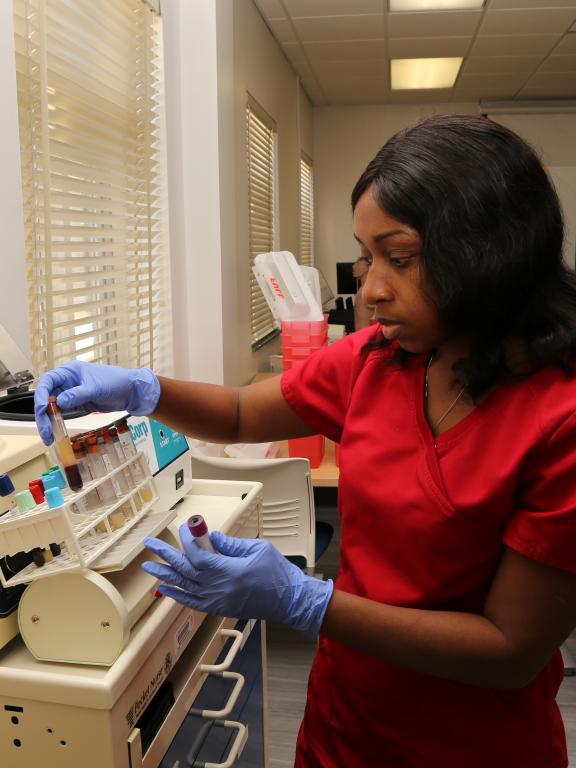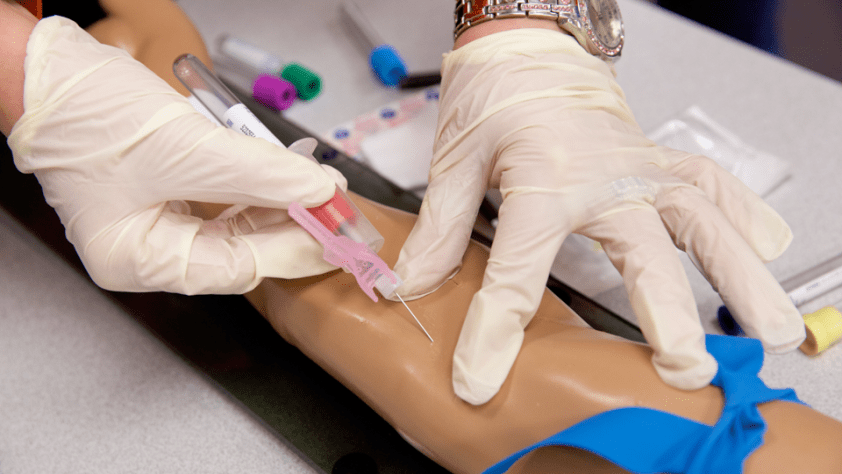How Phlebotomy Courses Near Me Can Fast-Track Your Entry into the Healthcare Field
How Phlebotomy Courses Near Me Can Fast-Track Your Entry into the Healthcare Field
Blog Article
The Course to Qualification: Understanding the Phlebotomy Educating Training Course Trip and Its Relevance
As you consider the course to qualification in phlebotomy, it's crucial to understand the role you'll play in medical care. Your training will certainly cover vital skills, from blood collection strategies to patient communication.

The Duty of Phlebotomists in Health Care
Phlebotomists play an important duty in the health care system, acting as the important web link between individuals and important analysis testing. You'll do blood draws, making sure samples are gathered properly and safely. Your expertise assists in detecting medical problems, monitoring health and wellness, and guiding treatment choices.
In your day-to-day interactions, you'll require to establish depend on with people, making them feel comfy during what may be a demanding experience. You are accountable for classifying and dealing with examples thoroughly to stop contamination or errors, which can affect test results.
Past this, you'll commonly work together with medical professionals and nurses, connecting crucial information about people' conditions. By grasping your abilities, you contribute meaningfully to client care, making you an essential part of the medical group.
Review of Phlebotomy Training Programs
When discovering phlebotomy training programs, you'll discover different types designed to fit various timetables and discovering styles. Each program helps you develop important skills like blood collection and patient communication. Recognizing these choices is crucial to selecting the ideal path for your profession.
Sorts Of Training Programs
Numerous types of training programs are readily available for those looking to end up being competent in phlebotomy. Furthermore, some medical facilities and clinics use on-the-job training programs, providing useful experience while you discover. Whatever path you select, each program intends to outfit you with the required abilities for an effective phlebotomy profession.

Secret Abilities Created
Mastering phlebotomy requires a collection of essential abilities that are created with extensive training programs. You'll find out technical skills like proper capillary choice, needle insertion, and blood collection techniques. These hands-on practices ensure you can execute procedures securely and efficiently. In addition, communication skills are basic; you'll need to interact with individuals, clarify procedures, and placed them comfortable. Understanding composition and physiology is vital, also, as it helps you find blood vessels and comprehend the body's response to blood attracts. You'll gain knowledge of security procedures and infection control, ensuring you maintain a sterilized atmosphere. Each of these skills is necessary for your success as a qualified phlebotomist, making you a valuable asset in any medical care setup.
Secret Components of a Phlebotomy Program
In a phlebotomy training course, you'll concentrate on crucial subjects that prepared for your future profession. You'll take part in hands-on training that allows you to apply what you have actually found out in real-world settings. Both the core educational program and practical experience are important for your success as a phlebotomist.
Core Educational Program Overview
While going after a phlebotomy training program, you'll encounter a core educational program made to equip you with essential skills and expertise. Phlebotomy Classes Near Me. This curriculum normally includes anatomy and physiology, focusing on the blood circulation system and recognizing blood components. You'll also discover various kinds of blood collection techniques, consisting of venipuncture and capillary slit techniques
In addition, infection control and safety methods are important elements, guaranteeing you understand exactly how to keep a sterile environment. You'll study patient communication, highlighting communication and empathy, which are important for alleviating person anxiousness.
Hands-On Training Experience
Obtaining hands-on experience is an essential part of your phlebotomy training program. This sensible training enables you to apply what you've found out in a real-world setup, improving your skills and self-confidence. You'll exercise venipuncture methods, learn just how to deal with different sorts of specimens, and obtain acquainted with the equipment made use of in the field. Under the guidance of seasoned trainers, you'll refine your abilities, ensuring you're prepared for any kind of circumstance you might deal with.
Additionally, you'll obtain the possibility to connect with individuals, which is vital for developing your interaction skills. This mix of technical efficiency and interpersonal skills is crucial for your success as a qualified phlebotomist. Ultimately, hands-on training is where concept meets method, solidifying your knowledge and readiness for qualification.
Accreditation and Licensing Needs
Before you can start your occupation in phlebotomy, it is important to recognize the accreditation and licensing requirements that vary by state. The majority of states require phlebotomists to hold a qualification from a recognized company, such as the National Phlebotomy Association or the American Society for Professional Pathology. These certifications usually entail passing a test that evaluates your understanding and abilities in the field.
In addition to accreditation, some states have certain licensing needs. You might need to complete a specific number of hours in scientific technique, send proof of training, or undergo a background check. It is essential to investigate your state's guidelines to ensure you fulfill all necessary criteria.
Staying educated regarding these needs not just helps you protect a position yet additionally boosts your trustworthiness as a professional. By meeting these requirements, you'll be well on your means to a successful profession in phlebotomy.
Hands-On Training and Practical Experience
Hands-on training and sensible experience are essential components of your phlebotomy education, as they enable you to apply theoretical expertise in real-world scenarios. Throughout your training, you'll involve in monitored venipuncture, find out proper methods, and end up being familiar with various blood collection tools. This direct involvement is essential for developing your confidence and sharpening your abilities.
You'll work very closely with skilled professionals that can direct you via the nuances of client communication and example handling. Each practice not only strengthens your understanding yet additionally prepares you for the busy setting of healthcare settings.
Additionally, lots of programs include scientific turnings, enabling you to experience varied setups, from hospitals to outpatient centers. This exposure assists you adjust to various challenges and client requirements, guaranteeing you're well-prepared for your future duty. Welcome these opportunities, as they're vital to coming to be a skilled and caring phlebotomist.
Difficulties Encountered During Training
While gaining hands-on experience is vital, it is necessary to acknowledge the obstacles that can occur during your phlebotomy training. You could experience stress and anxiety when performing treatments on real people, especially if you're brand-new to the atmosphere. The pressure to get every little thing right can be overwhelming. Furthermore, grasping the abilities needed for blood attracts takes practice; you may fight with method originally.
Time management can also be an obstacle, as balancing concept, sensible sessions, and personal commitments can feel intimidating. You may face varying discovering rates amongst your peers, bring about feelings of self-doubt if you think you're falling behind. Adjusting to the various personalities of instructors can be tough, as each might have an unique teaching style.
Acknowledging these challenges early on can prepare you for success and assist you establish strength throughout your training trip.
Job Opportunities After Certification

As you gain experience, you could even take into consideration focusing on areas like pediatric or senior citizen phlebotomy, catering Phlebotomy Training Course to details individual needs. Some phlebotomists pick to progress their professions by coming to be laboratory service technicians or pursuing additional education and learning in healthcare fields.
In addition, your certification can cause duties in training or supervising new phlebotomists, enabling you to share your understanding. With the medical care sector continually growing, your abilities will certainly always remain in need, leading the way for a stable and satisfying occupation. Welcome the possibilities waiting for you!
Frequently Asked Concerns
What Is the Normal Period of a Phlebotomy Educating Training Course?
Phlebotomy training programs usually last around four to 8 weeks. You'll take part in hands-on technique, class guideline, and on-line learning. Completing this training prepares you for accreditation and a fulfilling job in healthcare.
Are Online Phlebotomy Courses Available?
Yes, online phlebotomy courses are available. They provide versatility and comfort, permitting you to research at your very own rate. Simply validate the program is accredited to meet certification requirements and acquire useful abilities for your job.
Just How Much Does Phlebotomy Training Typically Cost?
Phlebotomy training usually costs between $700 and $2,500, depending upon the program and area. You need to consider factors like course length, consisted of materials, and hands-on experience when picking the appropriate training for you.
What Prevail Prerequisites for Phlebotomy Training?
Usual prerequisites for phlebotomy training usually include a high school diploma or GED, booster shots, and a background check. Some programs may additionally need standard health care expertise or accreditations, ensuring you're planned for hands-on training.
Can I Work While Finishing My Phlebotomy Training?
Yes, you can function while finishing your phlebotomy training. Many trainees equilibrium tasks with their researches, but make sure to manage your time properly to guarantee you satisfy both job and training dedications successfully.
Report this page